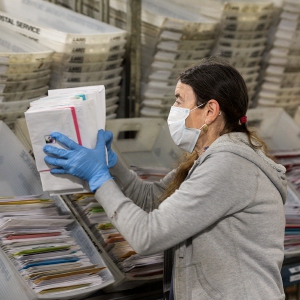Amid workforce shortage, Windsor sharing employees with other towns
| Published: 08-01-2023 4:29 PM |
WINDSOR — In an effort to recruit more employees and provide job stability, Windsor, Weathersfield and Bellows Falls, Vt., have joined together to share planning and zoning officials.
Town planner Halima Abuayyash became the trio’s first joint employee at the end of July, and Ryan Gumbart, who currently works part-time for Weathersfield, is scheduled to start a role in zoning administration and enforcement for all three towns this month.
“The handwriting has been on the wall for awhile,” Windsor Town Manager Tom Marsh said last month. “A lot of the positions have had long-serving people who are getting ready to retire and there’s not a big pipeline of replacement.”
The three communities are not alone when it comes to employee retention: According to a report from the National League of Cities, more than 300,000 municipal employees left their jobs between March 2020 and March 2022.
Marsh said that, while he has had informal discussions with other town managers for around five years ago, talks began in earnest during the last year after longtime Windsor Zoning Administrator Bob Haight retired and the town began looking for part-time employees to replace him.
In order to be a full-time employee, Haight took on multiple roles, including planning and economic development, Marsh said. Marsh noted it could be hard to balance three separate roles instead of having one person dedicated to that department.
“I think most of the positions we have require a specialized skill,” Marsh said. “You can find people that fall into the positions, or they can kind of blend with something else they’re doing, but it’s really hit or miss.”
Brandon Gulnick, town manager in Weathersfield, was attracted to the idea, in part, because it is hard to find part-time employees who are willing to stay long term and work without health benefits.
Article continues after...
Yesterday's Most Read Articles
 Homeless Upper Valley couple faces ‘a very tough situation’
Homeless Upper Valley couple faces ‘a very tough situation’
 Lebanon’s Jewell back from auto accident, more aware of ‘drowsy driving’ dangers
Lebanon’s Jewell back from auto accident, more aware of ‘drowsy driving’ dangers
 Plan on track to ship Upper Valley mail to Connecticut for sorting
Plan on track to ship Upper Valley mail to Connecticut for sorting
 West Lebanon crash
West Lebanon crash
 Crane crash on Interstate 89
Crane crash on Interstate 89
“Vermont municipalities are so small that you can’t justify a full-time position for certain positions,” Gulnick said last month.
He said turnover is higher for part-time employees, who will leave if they find a full-time job.
“It becomes this revolving door,” he said, “and it’s quite frustrating from a management standpoint, especially in positions that require a lot of knowledge and experience to be able perform correctly.”
Turnover leads to higher costs, as towns must then spend money to advertise, hire and train replacement employees, Gulnick added.
“People aren’t looking for part-time jobs anymore. They’re looking for full-time jobs,” Gulnick said. “If you can’t offer a salary where people can afford to pay their bills and still have time to spend with their family, you’re going to have vacancies.”
Over the last few decades, federal and state regulations have grown more complex, Marsh said. That requires municipal employees to have a certain skill set and undergo training to keep those skills current.
“It’s not like there’s this deep pool of talent out there,” Marsh said.
Abuayyash has a background in architecture and planning, a master’s degree in smart cities and is pursuing a doctorate at the University of Vermont in sustainable development, policies, economics and governance, said she was drawn to the role because it provides the “perfect chance” to apply her knowledge and experience.
“During my discussions with the town managers, it became clear that the main focus of the job is to improve walkability in the towns, revitalize the downtown areas, and make the towns resilient to different challenges and pressures,” Abuayyash wrote in an email. “One example of this is addressing housing availability and affordability, as well as building resilience in floodplain areas.”
Marsh said that each town is contributing around $30,000 per year, per regional employee, including benefits. The town managers are also splitting hours based on the needs of their towns.
“We know there’s going to be an ebb and flow in the workloads between the towns, and as long as we’re all getting what we need, it’s just going to be a flat amount,” Marsh said.
There may be other financial benefits that have not been fully realized yet: For example, it would easier for the three towns to join together to apply for grants for regional projects in areas such as transportation or recreation, Marsh said. He has also been discussing expanding the regional group to include more towns and positions, including assessing.
While the towns are near each other, proximity is not a necessity for some roles, Marsh said. The COVID-19 pandemic normalized remote work, and while both positions will have office hours, shared employees do not need to be physically present in the town to do work for that town. Both will have their specialties, but they will also be familiar with each other’s jobs so that they can fill in when needed.
“That flexibility has really helped this concept,” Marsh said. “I don’t think we would be attracting the same caliber of people without this shared (position).”
Liz Sauchelli can be reached at esauchelli@vnews.com or 603-727-3221.

 Kenyon: Constitutional rights should trump Dartmouth’s private interests
Kenyon: Constitutional rights should trump Dartmouth’s private interests
